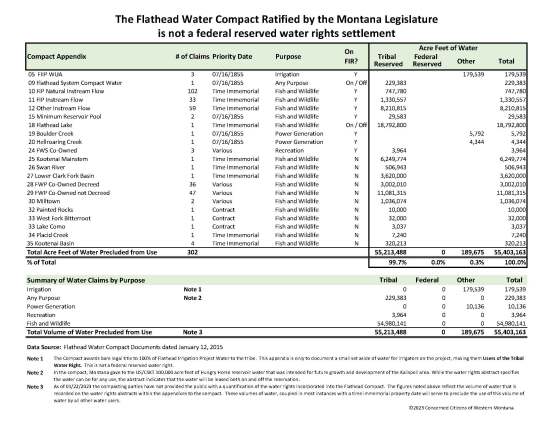© 2023 Concerned Citizens of Western Montana
A good amount of attention is currently being paid to Flathead Lake levels, however in reality, the reduced levels of the lake are only a small part of the larger problem that Montanans seriously need to wake up to, and that is the ongoing federalization of our land and water.
We can no longer afford to be distracted from the reality of what is literally taking place in front of us.

We only need open our eyes to it by stepping back and looking at the bigger picture of things.
The Water Court is currently reviewing the Flathead Water Compact Preliminary Decree. Mediations are going on as we write. The hearing track of their proceedings will begin in a few short months.
If the Flathead Water Compact stands, the vast amount of water awarded to the US / CSKT in the compact, in one way or another, will subject water users in western Montana to federal control.
The compact decree that is currently being reviewed:
- Awards to the United States / CSKT the use of more than two times the amount of water than actually flows out of western Montana each year.
Instead of quantifying the tribe’s “federal reserved water rights” for the present and future needs of the tribal people, the compacting parties fraudulently created “time immemorial tribal reserved water rights” out of thin air and used them as a vehicle to award vast amounts of water for “fish and wildlife” to the United States / CSKT both on and off the reservation.
By their definition the time immemorial priority dates on these water rights effectively preclude the use of more than 55 million acre-feet of water, and includes all of the natural water in Flathead Lake.
This is possible because the compact claims often cover more than one reach of a river or stream so as to maximize the amount of flow that is precluded (exclude or prevent) from being used for existing uses or future growth and development.
- Awards 100% of Flathead Irrigation Project water to the tribes, despite the fact that 90% of the lands served by it are privately owned by non-Indians.
The tribe will then “generously” mete out to irrigators a very small portion of the tribe’s unlawful compact acquired water to irrigators. In one big water compact fell swoop, irrigators with bona fide water rights appurtenant to their land, will be relegated to users of the tribe’s water with all of the terms and conditions that go along with it. Water deliveries to Flathead Project irrigator lands will be reduced a whopping 20-74% compared to historic use, depending upon the irrigator’s location and the duty of water assigned to their land.
- Awards to the CSKT 229,000 acre feet of Flathead System Compact water, the approximate equivalent of the top two feet of Flathead Lake.
This water is designated for any use, however the compact makes provisions for off reservation leasing of 11,000 acre feet of the tribe’s water. It is unknown how the remaining amount of water will be used or if it can be marketed to the highest bidders.
- Despicably and unlawfully cedes to the CSKT, Montana’s jurisdiction over every drop of water within the historic boundaries of the Flathead Reservation, violating constitutional due process and equal protections of more than 30,000 people by placing them under an unaccountable tribally controlled entity.
We were first introduced to the GRAND BARGAIN in 2012 at a compact commission meeting, when Chris Tweeten said: “…. the response is to remind the tribes about the Grand Bargain, and the fact that we agreed to do this extraordinary thing, frankly, with respect to agreeing to subject or to remove non-Indian rights on the reservation from the jurisdiction and control of the state, and place that somewhere else at the tribe’s request….”
Despite the fact that the compact was sold to the public for decades as a “final settlement of the tribe’s “federal reserved water rights”, the compacting parties gave us a bait and switch instead. No water in the compact abstracts include federal reserved water rights designated for the uses of individual tribal members, or even the tribal government corporation. The beneficiaries of the “tribal reserved water rights” in the compact seemingly will instead be the United States, “fish and wildlife”, and the tribal government treasury.
We recently reported that in some areas of Montana (Swan, Kootenai and Flathead River below Flathead Lake at Perma), the tribal water right in the compact exceeds the current stream flows, creating a situation where the water could be called if the compact were being enforced.
According to the terms of the compact, it is currently in effect, and it is being implemented.
Governor Gianforte has gone all out to ensure the Compact’s rapid implementation. It almost is as though Montana’s leadership knows its Water Court approval is a done deal.
Montanans need to fight this “foregone conclusion” with all that we’ve got.
While we are dismayed with the water shortages that people are experiencing, we are also grateful that they have helped to open many eyes to the complexity of the issues we are dealing with, including the perfect storm brewing when coupling the Flathead Water Compact with tribe’s ownership of Kerr Dam.
We believe that it was federal malfeasance that the United States did not recapture the dam when they had the opportunity to do so in the late 1970’s.
Pertaining also to the bigger picture, here’s an article posted in March that is related to the ongoing federalization of Montana’s land and water:
Is Montana Being Federalized via Conservation Easements and Land Acquisitions?
Don’t think for a moment that the vast amounts of federal money flowing through the state treasury aren’t serving to exert federal influence over our state agencies such as the DNRC and Montana Fish Wildlife and Parks. Their websites are full of “conservation” programs via conservation easements and land acquisitions funded by the feds and partnerships with environmental groups that are also funded with federal money.
We are all connected to this place, at this time, for this reason. This is a battle that Montanans must focus on, and engage in. It is a battle that we must win if we hope to protect our freedom, our property ownership and the property rights that go along with them.


Pingback: No One Dares Tell the CSKT What They Can or Can’t Do | Western Montana Water Rights